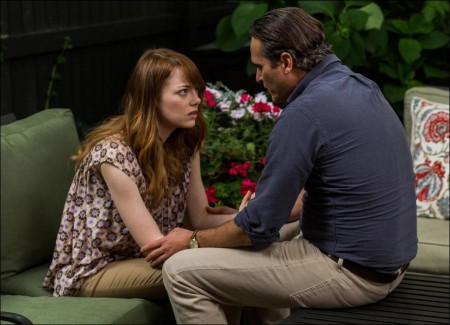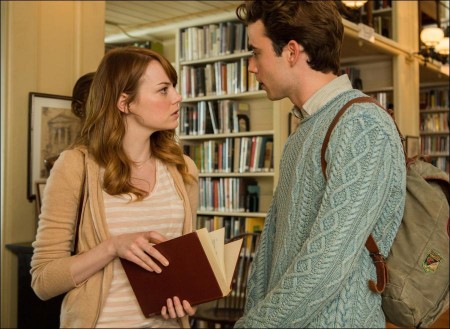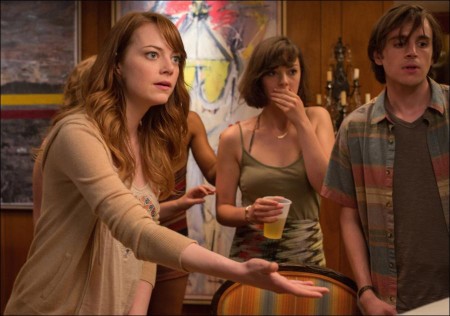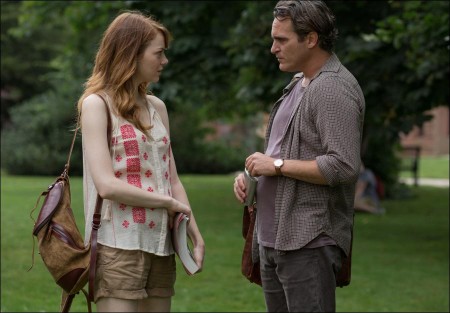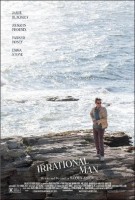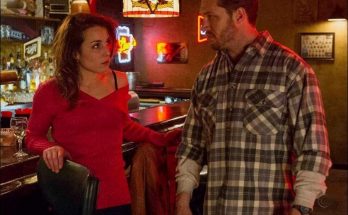Irrational Man Movie Storyline. At the small-town fictional New England college campus of Braylin, philosophy professor Abe Lucas (Joaquin Phoenix) finds himself in an existential crisis, but he eventually discovers a new purpose in life when he enters into a relationship with Jill Pollard (Emma Stone), one of his students. Jill’s boyfriend Roy (Jamie Blackley) gets fed up with Jill’s talking about Abe all the time and reluctantly breaks up with her.
At a diner, Abe and Jill overhear a conversation; a woman says she will lose her children in a custody fight because of a seemingly unethical judge in family court. Abe is troubled by the injustice and, without telling Jill, decides to help the woman by murdering the judge—since he is not related to the case he would not be suspected. Abe steals from colleague Rita (Parker Posey), with whom he has sometimes had sex, a key to the college’s science lab, where he steals cyanide. He finds out that the judge jogs daily and drinks a cup of juice on a park bench afterwards. Abe puts the poison in an identical cup and exchanges the cups surreptitiously on the bench. The judge dies as expected from cyanide poisoning.
Jill and Rita begin to discover clues to Abe’s involvement, such as the missing key and Abe being seen in the lab. Although she is in love with him, Jill breaks into Abe’s house and finds incriminating notes. Rita decides that even if he is guilty she wants to divorce her husband and go live abroad with Abe.
After Jill confronts him, Abe confesses to her. She decides to break off their relationship, but promises not to turn him in. However, after an innocent person becomes accused of the crime, she presses Abe to go to the police, warning him that otherwise she will report him. Abe, who has only recently started enjoying life, is determined not to lose that again by imprisonment or suicide. He attempts to kill Jill by pushing her into an elevator shaft he has rigged, but he slips and falls down the shaft to his death, leaving Jill to try to repair her own life.
American mystery drama film written and directed by Woody Allen, and starring Joaquin Phoenix, Emma Stone, Parker Posey and Jamie Blackley. The film was released on July 17, 2015 by Sony Pictures Classics in a limited release, later expanding wider. The film was Jack Rollins’ final production before his death in June 2015, having produced Allen’s films since the 1970s.
About the Production
In a role that suits his laconic, rum-soaked rhythms nearly as well as did the stoner detective from last year’s “Inherent Vice,” Joaquin Phoenix stars as Abe Lucas, a philosophy professor whose appointment to a small Rhode Island college sends tremors through the campus before he’s even set foot on it.
He’s an alcoholic who likes to have affairs with his students, says one rumor; his wife recently left him for his best friend, says another; he witnessed another friend get blown up by a land mine in Iraq, or maybe it was Afghanistan. Whatever the case, Abe Lucas seems to be the biggest thing to hit fictional Braylin College (actually Newport’s Salve Regina U.) in at least a decade, and Allen paints these opening scenes in such broadly comic strokes that you half expect the entire campus to erupt in a musical number upon Abe’s arrival.
Throughout his career Woody Allen has exhibited a fascination with philosophy. He’s lampooned it in comic essays like “My Philosophy,” plays like “Death Knocks,” and “God,” and movies like LOVE AND DEATH, and explored philosophical issues more seriously in films like CRIMES AND MISDEMEANORS and MATCH POINT. “Since I was very young for whatever reason I’ve been drawn to what people always call the ‘big questions,'” he says. “In my work they’ve become subjects I kid around with if it’s a comedy or deal with on a more confrontational way if it’s a drama.”
Allen’s early interest in philosophy took shape when he watched Ingmar Bergman’s films as a teenager. “They had a great grip on me,” he says. “At that time I had not read Nietzsche or Kierkegaard, philosophers that Bergman relied quite heavily on, but that material rang a very profound bell with me. I was riveted by his movies and the questions they asked and the problems that they dealt with. And subsequently over the years, I read a certain amount of philosophy and was able to understand more clearly who influenced him and what ideas he was dramatizing. And I grew to enjoy reading the philosophers, to compare them and how they challenge and disprove one another about their contrasting approaches to unanswerable questions.”
Allen’s absorption with philosophy has been so defining to his body of work that it has inspired several serious books about the philosophy found in his films. “I don’t think that anything I’ve written or dramatized has any originality philosophically-I’m simply a product of the philosophers I’ve read. I think the most you could say is that there are coherent philosophical themes that run through all or most of my pictures over the years. But they are obsessions of mine that center around issues many men have thought about. I’m interested in depressing realities that haunt me. They’ve haunted artists and thinkers far beyond me in every way, but I deal with them through my own point of view.”
The themes that Allen returns to so regularly in his movies are usually dark ones. This is obviously the case in explicitly bleak stories, like MATCH POINT, but even his lightest fare is touched with darker themes. IRRATIONAL MAN is a story that expresses an unvarnished picture of Woody Allen’s world view.
Abe Lucas (Joaquin Phoenix) is a philosophy professor who has lost his way. His study of the great minds has not made him happy-he has lost all faith in his vocation and hope for his future. “Abe is a guy who has always tried to do something positive with his life,” says Phoenix. “He’s gotten involved with political action and traveled to disaster areas around the world trying to help people. But terrible things happen to him and after awhile he starts to feel like nothing he does really makes a difference. And while he has enjoyed teaching in the past, he feels that very few of his students are going to be transformed in any significant way by what they learn in his class. Most will go on to ordinary lives and won’t ever examine life after they pass their last test.”
Says Allen: “What happens to Abe is that the ugliness and pain of existence and the terrible frailties of people have worn him down. He feels that he’s a personal failure because he’s never been able to make a mark. He’s just written all these erudite papers that have stimulated other professors and students to talk. But he’s reached a point where he just couldn’t care less about it anymore.”
Abe’s reputation as a controversial thinker with a tragic life precedes his arrival at Braylin, a small college on the East Coast, where he is to teach a summer session. He is both a subject of faculty gossip and great anticipation by the students. While Abe lives up to his reputation as an eccentric and charismatic man, the intensity of his gloom is unexpected. He also surprises his class by informing them that a lot of philosophy is no more than empty verbiage that doesn’t stand up TO the questions of real life.
Soon after his arrival at Braylin, Abe becomes involved with Rita Richards (Parker Posey), an unhappily married science professor. “Rita is a woman who feels stifled and trapped,” says Posey. “She’s not satisfied teaching; she’s drinking too much, smoking pot, and daydreaming about another life-something more fulfilling and passionate. She’s built up a fantasy about Abe that when he arrived he’d fall in love with her and eventually rescue her.”
Says Allen: “People must have told her that he’s a dynamic guy who really loves women, so she thinks that he’ll be the one that can get her out of her rat trap. She’s aggressive with him sexually and he is compliant, but he’s not really able to do anything.” Says Posey: “Abe ends up not having any more potency than her husband does. He’s unable to deliver and feels bad about that. He comes across as being distant, but he is really confused and lost-he’s not present.”
Meanwhile, Abe initiates a friendship with one of his students, Jill Pollard (Emma Stone), a bright young woman who has grown up at Braylin, where her parents are professors. “Jill is a clean-cut girl who’s always been on the straight path to somewhere, but she really doesn’t know where that is,” says Stone. “She’s been in this small town her whole life, so there’s something that draws her to taking this philosophy course which she hopes will expand her view of the world. And Abe, who is this tortured, poetic artist, is the human equivalent of everything she’s wanted to explore in her life but hasn’t really known how to do on her own.” Says Allen: “Abe is a lonely guy and he sees Jill as someone he can talk to. He’s not thinking about her romantically, but he has a serious intellectual connection with Jill which keeps growing until she becomes the person he spends most of his time with.”
Jill has a steady boyfriend in Roy (Jamie Blackley), who must put up with her growing fascination about Abe. Despite her constant assurances to Roy that she’s committed to him, she talks about Abe’s amazing qualities virtually non-stop. “It’s constant,” says Blackley. “All day long it’s ‘Abe did this, and Abe said that, and Abe has this fascinating idea.'” Says Stone: “Once Jill sees Abe, Roy starts to look a little bit like Greek yogurt-good for you but not necessarily exciting-and Abe is like the poisonous fruit topping on the Greek yogurt.”
Roy is deeply in love with Jill and willing to hang on, despite his sense that she’s slipping away. “The thing that’s really striking about Roy is how patient and understanding he is,” says Blackley. “From the beginning he’s questioning her interest in Abe, but he puts it in the back of his mind until it becomes an issue and starts getting in the way of their relationship.” Says Stone: “At first I think that Jill really wants to believe that it’s just a friendly bond she’s forming with Abe, so she’s keeping her bases clear. But once she starts pushing Abe to get involved, she knows she is lying. I think she’s trying to have her cake and eat it too because she’s young and confused and wants the best of both worlds.”
It first becomes evident to Jill that there is something seriously wrong with Abe when he picks up a loaded gun at a party and plays Russian Roulette, spinning the chamber several times. While Jill is terrified, she finds a way to justify this reckless action in her mind. “Abe turns everything into a philosophy lesson,” says Stone, “and Jill is an eager student of those lessons because she’s trying to be a radical thinker like him.
As scared as she is, she’s in a bubble, wanting to see the best in these situations that are unfolding in front of her.” Also, Jill is falling for the romantic idea that she will be the one who will liberate Abe from the hole that he’s in. “The idea that she can rescue somebody who’s in such an alcoholic, downward, suicidal spiral is selfishly rewarding for her,” says Stone. “She’s never had the experience of helping someone out of a dark place-and she doesn’t realize that can lead you into the darkness too.”
Abe’s life turns around after a completely unexpected event. He and Jill are sharing a meal at a diner when they happen to overhear a highly emotional conversation in the next booth. Abe and Jill both react to the conversation, but Abe quickly becomes consumed with what he hears. He secretly decides that the time has come to get involved. “Abe decides he’s going to take the bull by the horns and chooses to act,” says Allen. “It’s not an abstract action, like writing a letter to the New York Times or going on impotent protests. Here is a course of action that is within his grasp to perform that will really make a difference.”
Abe’s decision rejuvenates him. He transforms from somebody who is aimless and depressed to someone who has energy and exuberance. “He has a sudden appreciation of life,” says Allen. “He enjoys the taste of wine and sex again, and having a good hearty breakfast and getting sleep.” He wants to live. Says Phoenix: “Abe is able to re-embrace life because he finally has a clear-cut goal he believes in. It’s exactly what he’s been looking for without even knowing he was looking for it. Not only does he think he’s doing something positive but he places himself in an adventure, putting his plan into action.”
Not knowing the real reason, Jill assumes she is the cause of Abe’s sudden joy. “She sees herself as 100% responsible,” says Stone. “It was how much she understood him and how much she was there and told him how poetic he was. She finally saved him.”
Of course, the action that Abe is preparing to take is something irrational. He is able to rationalize it, but it’s not an argument that can hold up to scrutiny. Says Allen: “What Abe finds to believe in is this irrational enterprise, the product of his years of distortion and anger and frustration over the ways of the world and the ways of people.” Abe feels he can do what he does because he believes in challenging conventional norms. But he is anything but the man of reason he considers himself to be. Says Allen: “As Jill’s mother says in the film, Abe’s work is only a triumph of style; his substance doesn’t hold up if you pursue it. He’s good with words, he makes bright, educated arguments that sound good, but if you really take them to their marrow, they don’t stand up.”
IRRATIONAL MAN was shot in Newport, Rhode Island, with the campus of Salve Regina University standing in for the fictional Braylin College. The locations were all shot in Newport, Providence, and its environs. The soundtrack is largely the Ramsay Lewis Trio, notably “The ‘In’ Crowd,” as well as “Wade in the Water,” and “Look-A-Here.” Says Allen: “It’s got a relentless, pulsating beat that works very well for the visual material, whether people are driving to it or walking to it or behaving badly to it. There’s a hot tone and rhythm to it, so it suggests the tempestuousness of every character’s personality.”
As with many of his intimate dramas, Allen shot the film in widescreen. Says Allen: “I very often feel the smaller kind of stories play very well in widescreen, contrary to the thought some have that you need to have a Western or a war picture to be on a widescreen.” Unlike the more romantic visual style he utilized in his recent films like MIDNIGHT IN PARIS and MAGIC IN THE MOONLIGHT, he felt that the material called out for realism. “It’s much easier to do a picture about Paris in the 1920s, with street lamps, cobblestones, coaches with horses-and make it look like a million bucks,” he says. “But to make a film like this visually appealing does require a lot of planning and I think we did do that. But I didn’t want any extra stylization to interfere with the story because the important thing is for the audience to hook up to the characters, and fortunately, the actors gave me that.”
Allen feels that Phoenix possesses a “built in complexity” that served the role. “Everything you give him to do or say becomes interesting because of this complexity he naturally projects,” says Allen. “There’s something going on there all the time.” Stone stars in her second Woody Allen film in a row after MAGIC IN THE MOONLIGHT. “Emma projects intelligence,” says Allen. “She’s got tremendous range-very funny when she needs to be and intensely dramatic when she needs to be.”
“When I read the script,” says Stone, “it raised a lot of questions for me about morality. Abe doesn’t live by the world’s rules and Jill is trying to figure out how far she can go.” Stone continues: “I also liked that the script explores the themes of randomness and fate that were in MAGIC IN THE MOONLIGHT and so many of his other films.”
Randomness is central to IRRATIONAL MAN. It hinges on a string of chance occurrences that have life and death consequences. Its story illustrates one of Woody Allen’s core philosophical beliefs. “I’m a great believer in the utter meaningless randomness of existence,” he says. “I was preaching that in MATCH POINT and Abe preaches it in his class. All of existence is just a thing with no rhyme or reason to it. We all live subject to the utter fragile contingency of life. You know, all it takes is a wrong turn on the street…”
Irrational Man (2015)
Directed by: Woody Allen
Starring: Emma Stone, Joaquin Phoenix, Parker Posey, Jamie Blackley, Meredith Hagner, Ethan Phillips, Allie Marshall
Screenplay by: Woody Allen
Cinematography by: Darius Khondji
Film Editing by: Alisa Lepselter
Costume Design by: Suzy Benzinger
Set Decoration by: Jennifer Engel
MPAA Rating: R for some language and sexual content.
Studio: Sony Pictures Classics
Release Date: July 17, 2015
Visits: 11
